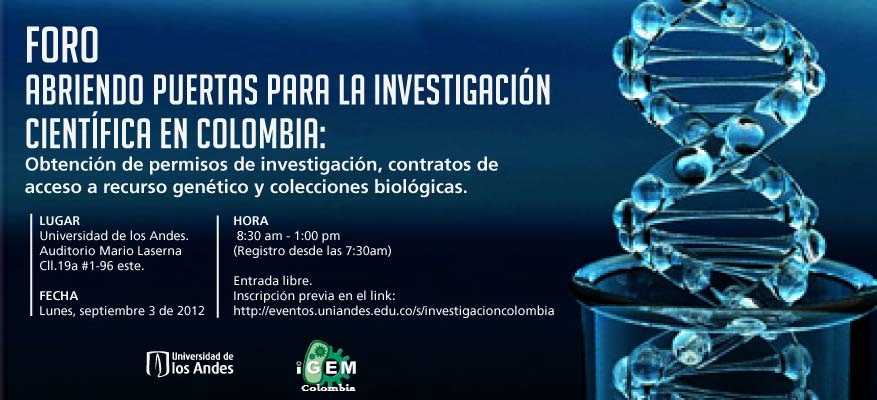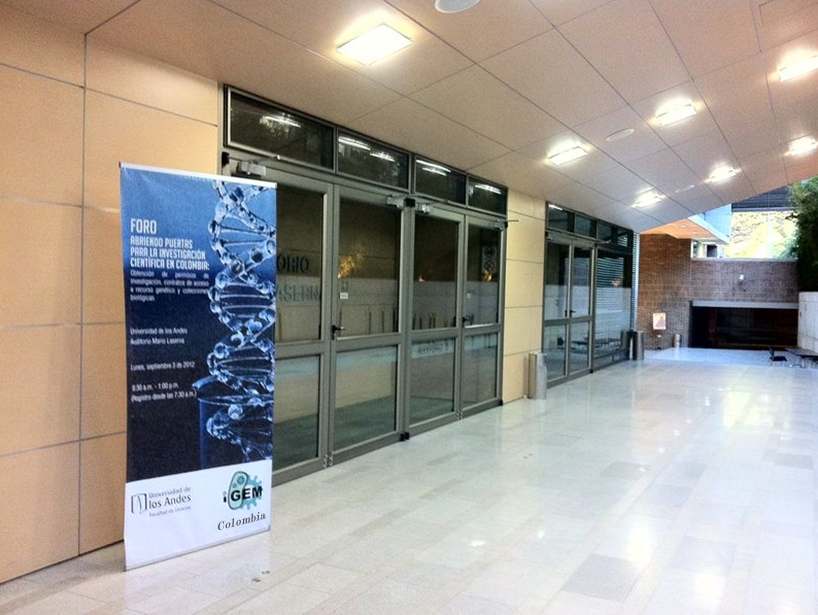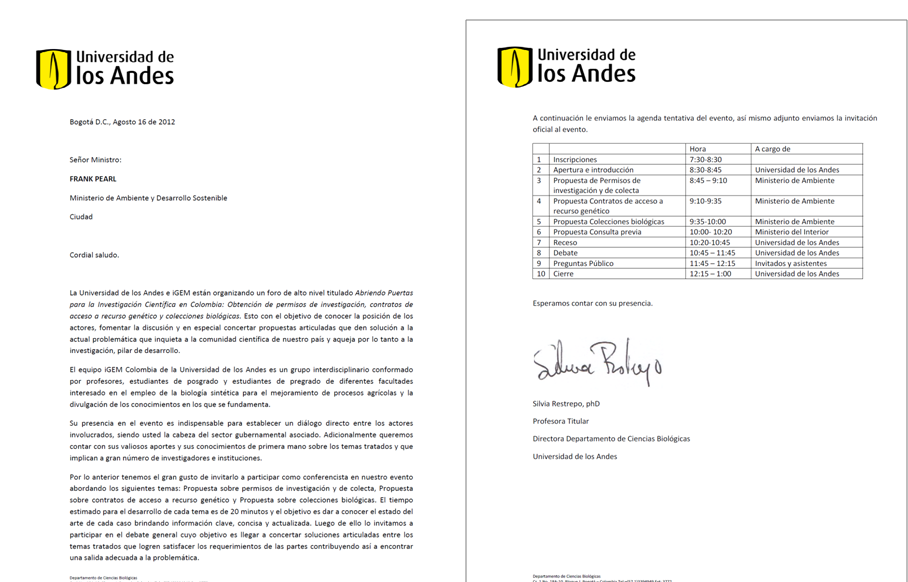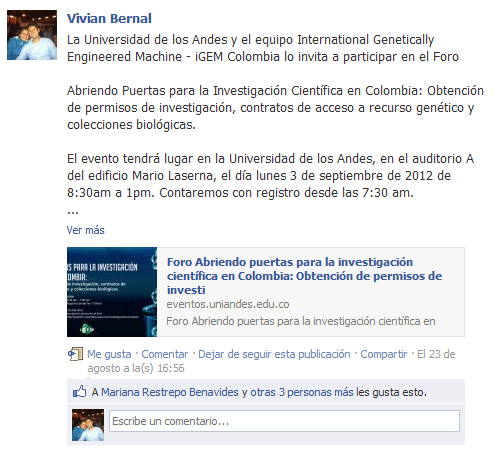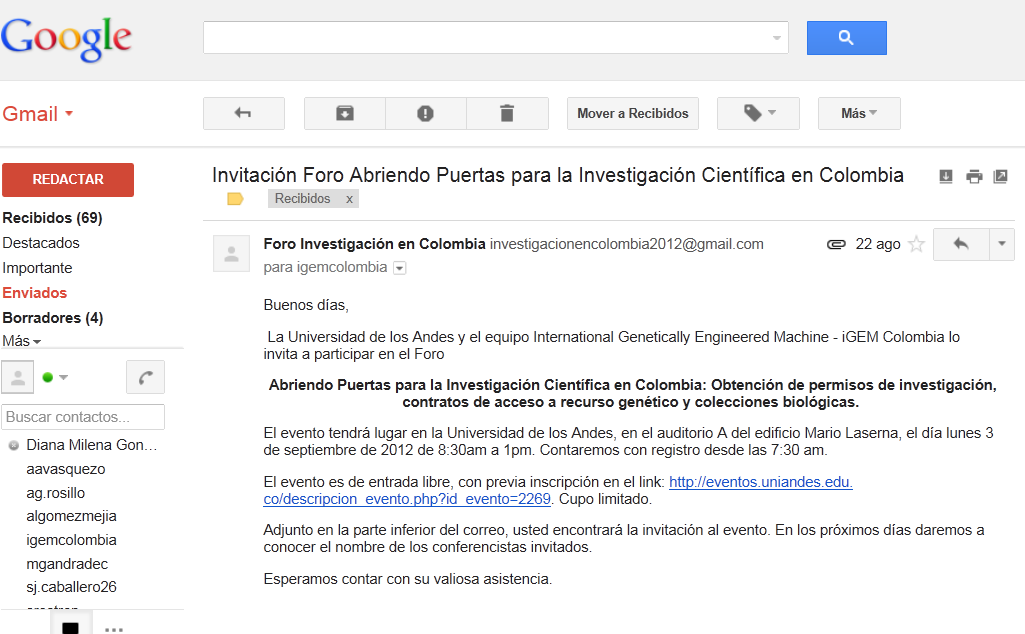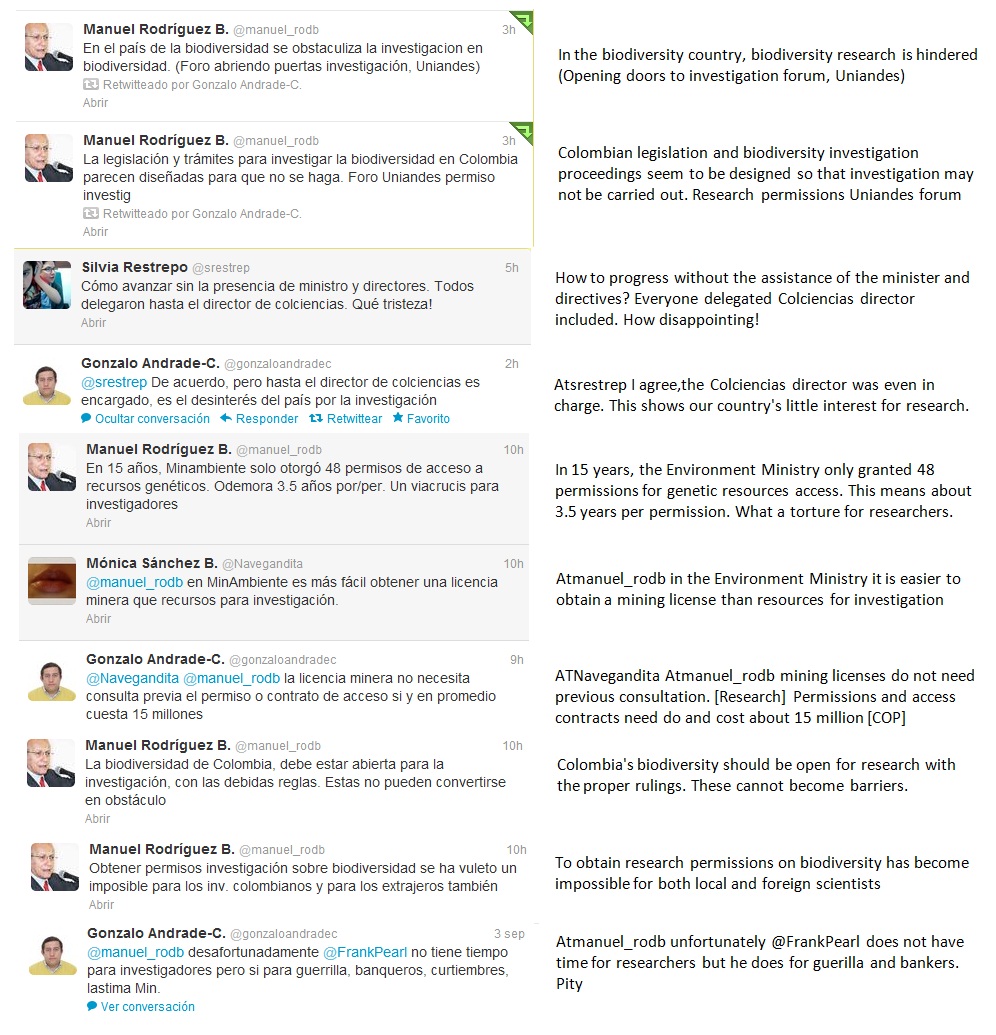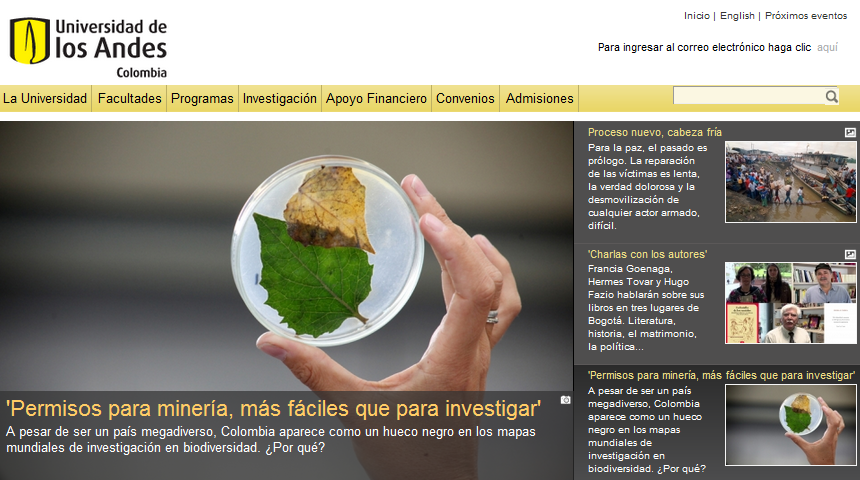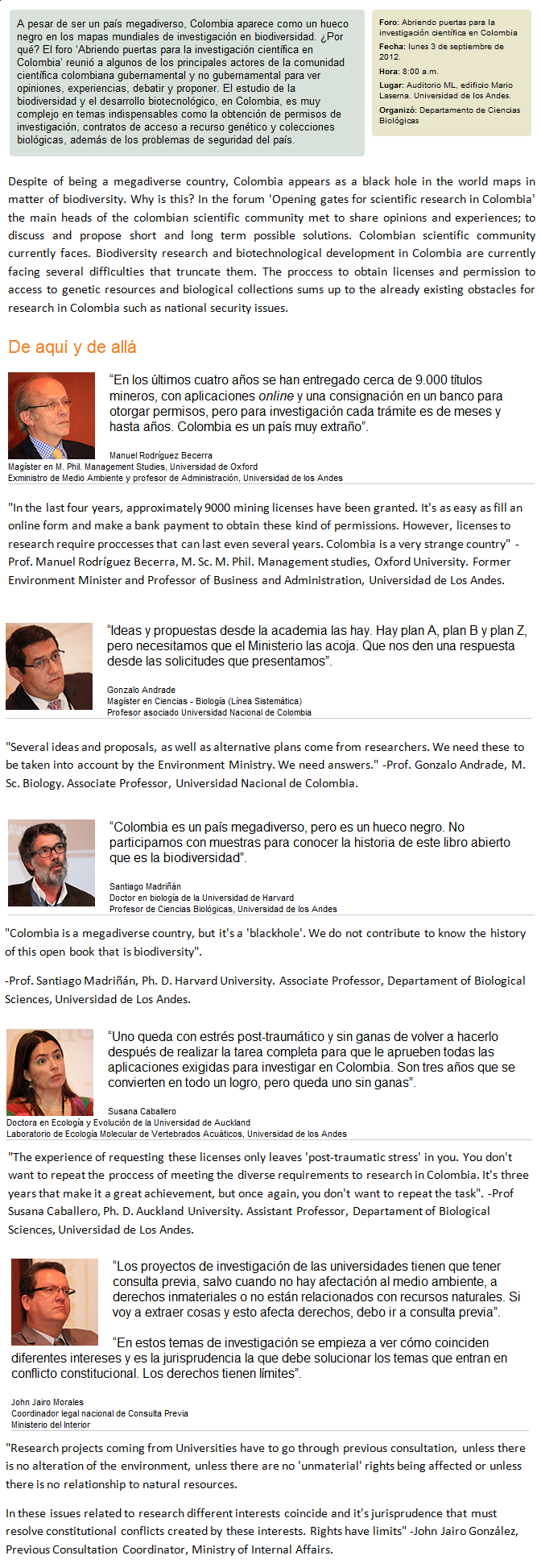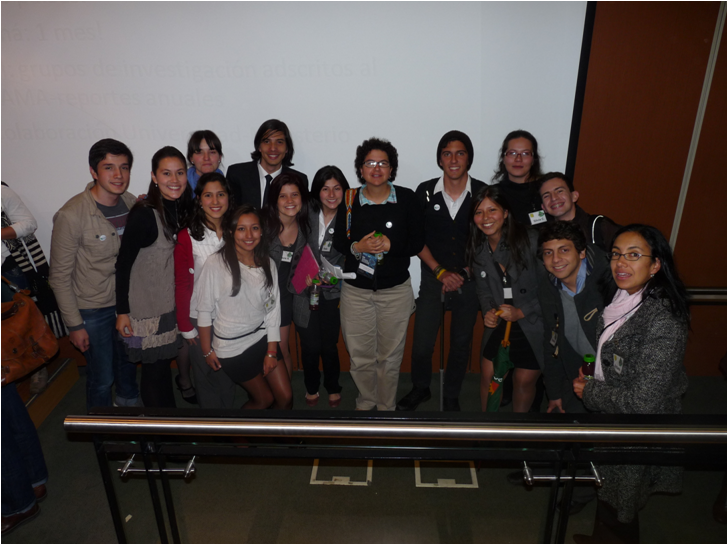Team:Colombia/Human/Research
From 2012.igem.org
(→Team Colombia @ iGEM 2012) |
(→Results and Conclusions) |
||
| Line 254: | Line 254: | ||
=='''Results and Conclusions'''== | =='''Results and Conclusions'''== | ||
| - | + | ||
| - | + | ||
| - | + | ||
| - | + | ||
<p align="justify"> | <p align="justify"> | ||
Is necessary to include the scientific ambit into the Colombian politics, taking in account their ideas in the decisions making. In this way, it would be possible to change the actual legislation for become it more efficient and making easier the access to genetic and biodiversity resources, the changes in legislation are going to promote the knowledge generation and scientific research. | Is necessary to include the scientific ambit into the Colombian politics, taking in account their ideas in the decisions making. In this way, it would be possible to change the actual legislation for become it more efficient and making easier the access to genetic and biodiversity resources, the changes in legislation are going to promote the knowledge generation and scientific research. | ||
Revision as of 03:03, 27 September 2012
Team Colombia @ iGEM 2012
Template:Https://2012.igem.org/User:Tabima
Legislative aspect: Implications for Scientific Research in Colombia
The Proposal
In the frame of the synthetic biology competition International Genetically Engineered Machine (iGEM), Colombia’s Team from the Universidad de los Andes, as human practice activity, proposed to develop a high level forum with the goal to create spaces where opinions and ideas are exposed in order to promote discussion and contribute to the continuous search of solutions to the problematic related with scientific investigation within the legal frame in Colombia. The problematic consists in several inconvenients to obtain contracts that grant legal access to Genetic Resources and biological collections in our country and the long time waiting to obtain research and collect permits in order to investigate our own biodiversity.
The objectives
To discuss between the Colombian government and the scientific community, a factible and articulate proposal to resolve an important problematic in Colombia, concerning the rigorous process to obtain research and collect permits, contracts granting access to genetic resources and biological collections.
• To meet the governmental and no governmental figures and discuss about their position at this topic and proposals.
• To encourage the discussion between several figures involved in the scientific and legal frame in order to expose different points of view
• To obtain a generalized new proposal with the approbation of all parts.
Forum Research in Colombia: Obtaining Research Permits, Contracts for Access to Genetic Resources and Biological Collections
The preparations
For the event organization we contacted to Gonzalo Andrade from Universidad Nacional de Colombia, an expert about the topic, he was our assesor.
The Guests
We had 61 guests as special guests belonging to scientific community and to governmental institutions. We used several media for to guarantee the all institutions representation. We sent invitation letters and comments by Twitter, also electronic confirmations (by the forum email investigacionencolombia2012@gmail.com) and by phone. In adiction to this the forum was a open access event so we had general invitations for the general public interested in the topic. We had a total of 400 seats. Check out the special guests list! File:Special Guests List.pdf
Invitations
We sent 61 special invitation letters
We sent message to Minister by Twitter
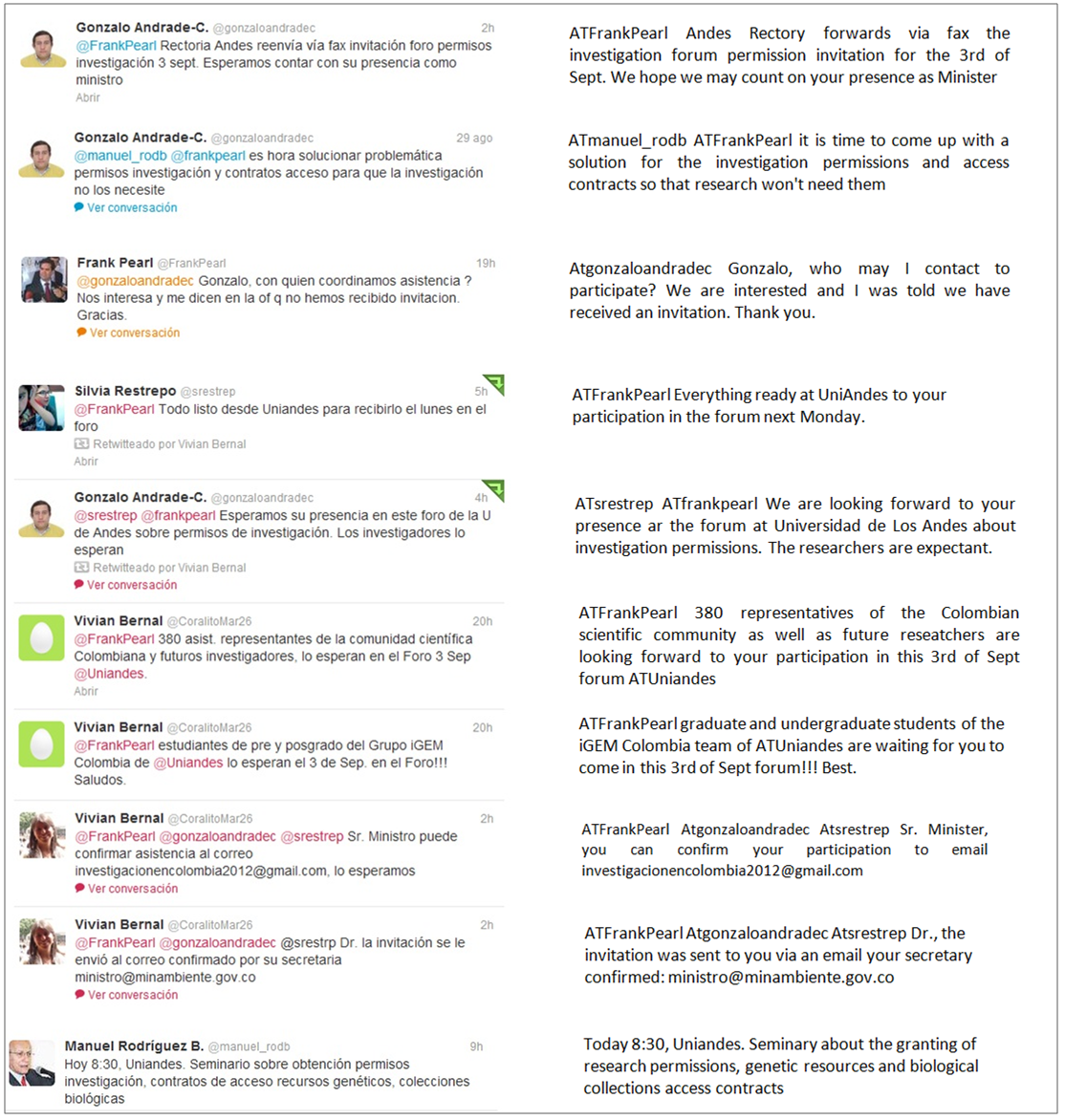
Adicionally, we spread the event in social networks and by email to interested people groups
In other departaments of our University and in others universities with flyers and posters
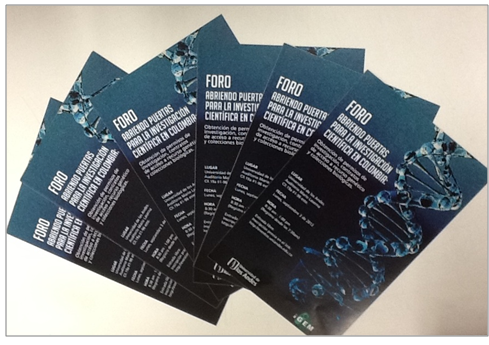
And We put the event in the events site of Universidad de los Andes where all the participants should be registered
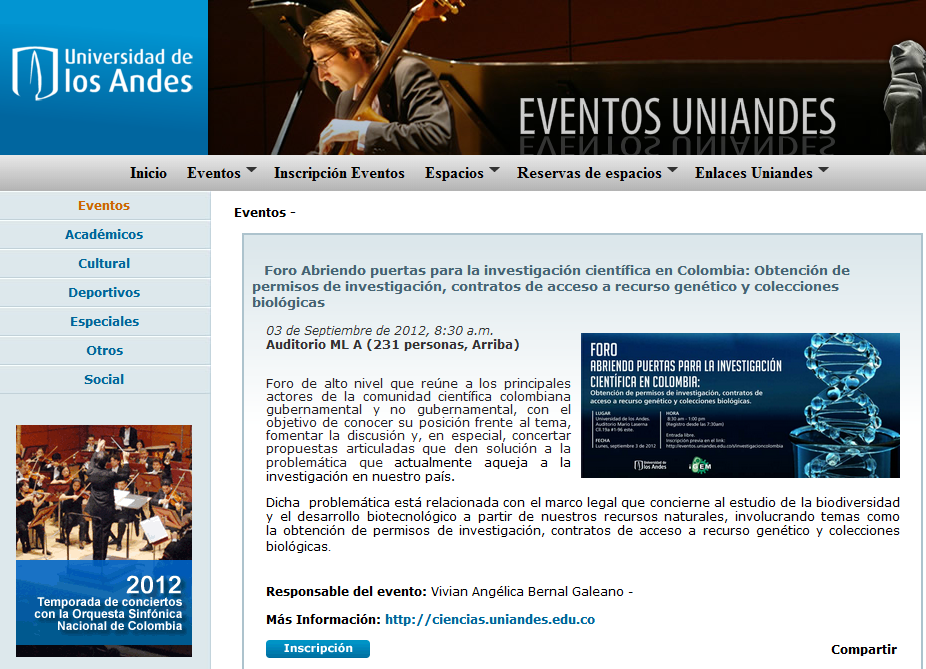
September 3 of 2012, 6:00am: Early the day of the event
All the team arrived early to complete details of the event
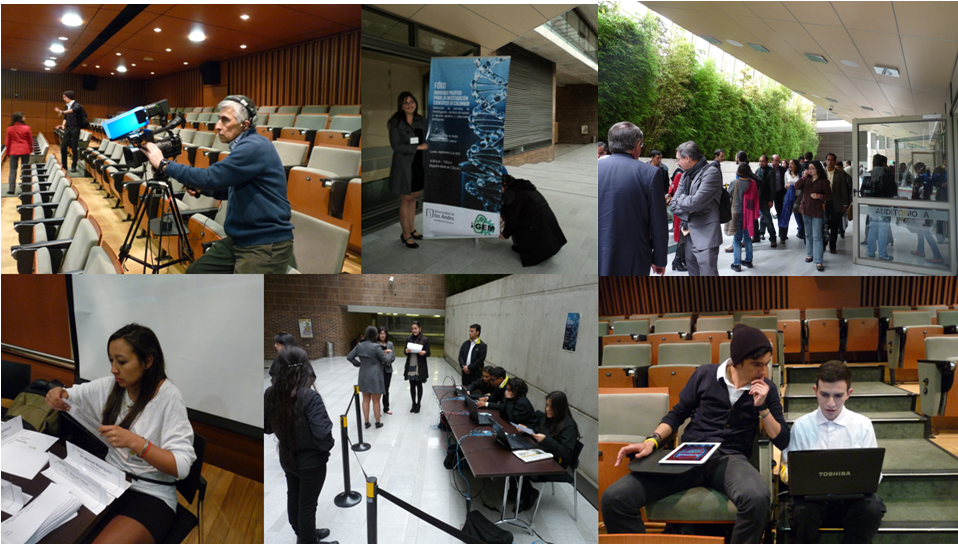
Event Development
The moment arrived. Welcome
Check up our File:Forum Schedule.pdf
And started...
The forum started at 8:30 am but the people arrived since 7:00 am because in the auditorium we had limited places and the forum had a lot acceptation. We opened with the welcome speech of Dr. Silvia Restrepo, the Head Director of the Department of Biological Sciences, who was follow by Los Andes University rector, Dr. Pablo Navas Sanz de Santamaria. It was realized the presentation of the main board conformed by:
- Dr. Manuel Rodriguez: He is Industry engineer from Los Andes University and the first Environmental Minister in Colombia. In this event we had the pleasure of have him as moderator.
- Dr. Claudia Rodriguez: She is part of the Biodiversity Forest and Ecosystemic Services direction from the Ministery of Environment and Sustainable Development. She opened the discussion with a talk about the actual genetic and biodiversity resources legislation and access, making a focus on the actual problems and changes that are being made for resolve this problems (State of art).
- Dr. Jhon Jairo Morales: He is a lawyer that works as legal coordinator of prior consulting in the Ministery of Interior. He showed the legislation for prior consulting of afro-american, indigenous and gipsy communities before perform a field research or collecting in the territories where they live. He informed to the participating people about changes and new proposals in this legislation.
- Dr. Susana Caballero: She is associate professor from Los Andes University and director of the laboratory of molecular biology of marine mammals (LEMVA). She participated in the feedback with several experiences about her research and obtaining of permits for them.
- Dr. Santiago Madriñan: He is associate professor from Los Andes University and director of the Laboratory of Botanic and Systematics. He participated in the feedback with his personal point of view about research permissions.
- Dr. Gonzalo Andrade: He is associate professor from National University of Colombia and director of the Natural Sciences Institute. He showed his own experience about the obtaining of permissions and illustrated how long does it take the process for obtain them. Approximately 3- 5 years for project, expending in average 2000 dollars.
Following the feedback there was a place for a discussion between the main board members, special guests and the audience. Like special guests, there were important people of the researcher´s community.
Coverage
While the event was developed people that were not present were informed through Twitter about the main ideas discussed. For more information follow us on Twitter @colombia_igem
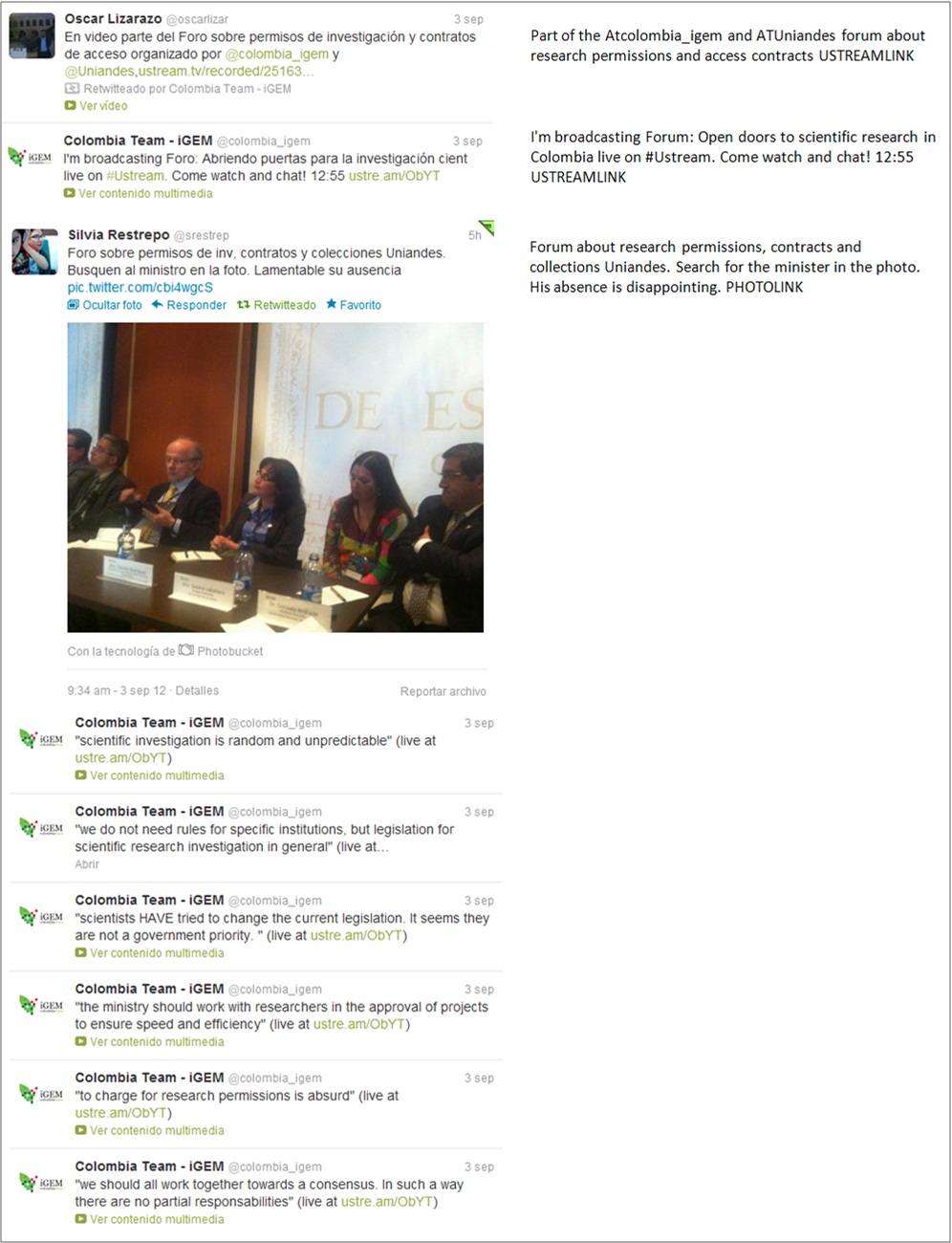
People that was not present could follow the even throgh live streaming, check it out!
Live streaming http://www.ustream.tv/channel/11962459
We invite you to follow our forum in pictures. Check it out!
Reactions
Twitter Reactions
Media Coverage
At the main site of University
Results and Conclusions
Is necessary to include the scientific ambit into the Colombian politics, taking in account their ideas in the decisions making. In this way, it would be possible to change the actual legislation for become it more efficient and making easier the access to genetic and biodiversity resources, the changes in legislation are going to promote the knowledge generation and scientific research.
The forum created a necessary bridge between the researchers and the government. Thanks to this, some agreements and proposals were made:
- Is necessary to generate agreements and formal links between scientists and the government. With this aim, the scientific community proposed to create a scientific commission that would evaluate the projects proposals for giving the access permissions. Furthermore, the investigation with academic aims should be promoted giving free access to genetic and biodiversity resources with the condition and obligation of make the publication of results in a scientific magazine.
- The scientific community made the compromise of getting all the specifics proposals together and unifying ideas from previous scientific negotiation tables, in order to send a formal propose document to the government and in this way, this proposals can be include or taken in account in the changes that are being made at this moment.
 "
"
